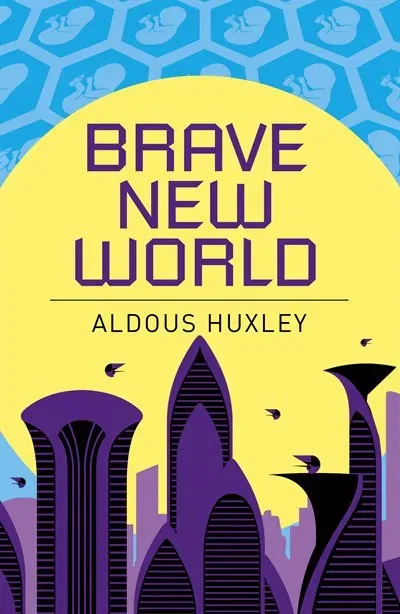Brave New World was not what I expected in the least. It was written in the 30s but it could just as easily have been written today. I don’t know what particular points the author was trying to make with this book, but it was a very political work for a fiction piece, and before digging into what others have to say, I’m going to make my own case.
The society in the book wasn’t of any particular ideology I can pinpoint besides, perhaps, futurism. The book opens by a director leading students on a tour of a facility that produces babies, parenthood being rendered not only obsolete, but obscene. And to go further than that, they can create 87 identical babies at a time. To me, that sounds like a scientific horror, something right out of frankenstein, but to them it means stability (and conformity).
“Everybody belongs to everybody,” is a recurring theme throughout the book, repeated by everyone, leading to a society where solitude is discouraged and monogamy can get you in trouble.You are not your own person, your individuality is nothing to be proud of. Yet the most obvious way this is manifested is through sexual relations, where you don’t ‘love’ someone, you merely ‘try’ them.
The family unit is already losing its importance in western society today, can you imagine if children and STIs were removed from the equation? Many people don’t need the hypnosis training they have in Brave New World to want a piece of that action. The reason it works in this fictitious society is because science has made pleasure without pain possible, as John ‘The Savage’ points out in the end of the book when he comments on how these so-called civilized people need to cry, hurt, and struggle more.
Which leads me to mention Soma, the drug with no supposed side effects that are encouraged through hypnosis, rations, and peer pressure. Linda, the ex-civilized woman, mentions how much she misses soma when compared to the alcohol on the reservation, which leaves you sick and tired the next day. When she does make it back to England, she puts herself in a never ending soma-holiday, something I imagine she dreamt of ever since she found herself trapped there.
Not, I’ve had my fair share of alcohol, but they go to the extreme with soma. Whenever they are slightly uncomfortable they reach into their pocket and take one of these miracle pills. It has stripped them of the human experience all together, I’d say. Lenina demonstrates beautifully how reliant she is on this drug, taking it every time something slightly disturbing happens. Bernard talks about being an individual,which goes against what they have been taught? Soma. Sees a ritual on a savage reservation? Soma. Scared to come on to The Savage they bring back from the reservation? Soma. Gets rejected by said Savage? Soma.
God forbid she experience a real emotion for once!
Their lives are just work, soma, and distractions. There’s no meaning, and they know this, which just makes them take soma more. It’s sad, really. They’re all soma-holics in denial. Imagine if our society not only saw nothing wrong with drug or alcohol abuse, but you were shunned if you were not abusing them yourself!
But then, aren’t we? Those have negative side effects that are too obvious to deny, what if we had harmless old soma? Would we be taking it to get through every day? I know I can handle a day sober, but I still have less harmful and socially acceptable distractions. Copious amounts of hobbies, food, television, and the worst culprit, my phone.
If Brave New World was a prediction, it was only half wrong. Science didn’t give us soma but it did give us the internet! A hole in which so many of us struggle to get out of. I can’t completely blame Lenina, but damn if I wouldn’t have felt better seeing her escape her addiction. I really did have higher hopes for her.
Which leads me to another addiction, consumerism. In this book, it is encouraged. They have some mantras they live by, such as, “Ending is better than mending.” They are encouraged to consume, consume, consume. If they stay home and buy nothing, they are not doing their duty to society. How sad of an ideal that it. To not care about your belongings, to toss them the second they are not working perfectly. Their society tells them this is selfless, but in reality it is just the opposite.
I want to be optimistic and say with minimalism, more sustainable options, and environmental consciousness, we are actually improving in this area. Still worse than the 30s I’m sure, but not as much as in this book, and maybe not even as bad as a decade ago. That’s my wishful thinking, anyway. The rise of Amazon has a different story to tell, but that’s a topic for another day.
There’s a lot wrong with the society in the book, both the civilized and uncivilized one, but it is well written. A work of art, really. I’d recommend this to everyone as I think it should be considered a classic, and like Animal Farm, a warning against one of our possible futures.
I hope you come out of it as I did and self reflect on your decisions and what kind of world they are creating for your children.
I give Brave New World a 10/10.

Check out my blog for these reviews at https://theremarksofareader.wordpress.com/